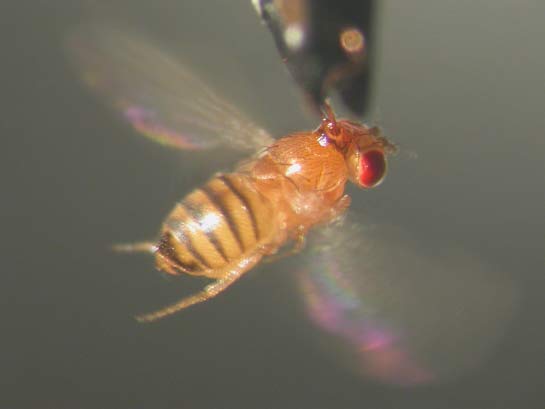Farfetched? Hint of Free Will Found in a Fly

Get the world’s most fascinating discoveries delivered straight to your inbox.
You are now subscribed
Your newsletter sign-up was successful
Want to add more newsletters?

Delivered Daily
Daily Newsletter
Sign up for the latest discoveries, groundbreaking research and fascinating breakthroughs that impact you and the wider world direct to your inbox.

Once a week
Life's Little Mysteries
Feed your curiosity with an exclusive mystery every week, solved with science and delivered direct to your inbox before it's seen anywhere else.

Once a week
How It Works
Sign up to our free science & technology newsletter for your weekly fix of fascinating articles, quick quizzes, amazing images, and more

Delivered daily
Space.com Newsletter
Breaking space news, the latest updates on rocket launches, skywatching events and more!

Once a month
Watch This Space
Sign up to our monthly entertainment newsletter to keep up with all our coverage of the latest sci-fi and space movies, tv shows, games and books.

Once a week
Night Sky This Week
Discover this week's must-see night sky events, moon phases, and stunning astrophotos. Sign up for our skywatching newsletter and explore the universe with us!
Join the club
Get full access to premium articles, exclusive features and a growing list of member rewards.
A spark of free will may exist in even the tiny brain of the humble fruit fly, new findings that could shed light on the nature and evolution of free will in humans. Future research delving further into free will could lead to more advanced robots, scientists added. The result, joked neurobiologist Björn Brembs from the Free University Berlin, could be "world robot domination." "Seriously though," Brembs said that programming robots with aspects of free will "may lead to more realistic and probably even more efficient behavior, which could be decisive in truly autonomous robots needed for planetary exploration." Helping people Better understanding aspects of free will in humans could also help treat mental disorders where people face problems controlling how they feel, think or act, such as depression, obsessive-compulsive disorder , anorexia nervosa, schizophrenia or attention deficit hyperactivity disorder (ADHD), Brembs told LiveScience. For centuries, the question of whether or not humans possess free will—and thus control their own actions—has been a source of hot debate. "Free will is essentially an oxymoron—we would not consider it 'will' if it were completely random and we would not consider it 'free' if it were entirely determined," Brembs said. In other words, nobody would ascribe responsibility to one's actions if they were entirely the result of random coincidence. On the other hand, if one's actions were completely determined by outside factors such that no alternative existed, no one would hold that person responsible for them. "We speculate that if free will exists, it is in this middle ground" between randomness and determinism "that is currently not well understood or characterized," said mathematical biologist George Sugihara at the University of California, San Diego. Insects and other animals are often seen just "as very complex robots," Brembs said, for which behavior is determined solely by reactions to the outside world. When scientists observe animals responding in different ways to the same outside cues, such variations are typically attributed "to random errors in a complex brain," he said. Not just random Brembs and his colleagues reasoned that if fruit flies (Drosophila melanogaster) were simply reactive robots entirely determined by their environment, in completely featureless rooms they should move completely randomly. To investigate this idea, the international team of researchers glued the insects to small copper hooks in completely uniform white surroundings, a kind of visual sensory deprivation tank. These flies could still beat their wings and attempt to turn. A plethora of increasingly sophisticated computer analyses revealed the way the flies turned back and forth over time was far from random. Instead, there appeared to be "a function in the fly brain which evolved to generate spontaneous variations in the behavior," Sugihara said. Specifically, their behavior seemed to match up with a mathematical algorithm called Levy's distribution, commonly found in nature. Flies use this procedure to find meals , as do albatrosses, monkeys and deer. Scientists have found similar patterns in how emails, letters and money travel and "in the paintings of Pollock," Brembs said. These strategies in flies appear to arise spontaneously and not result from outside cues, findings detailed in the May 16 issue of the journal PLoS ONE. This makes their behavior seem to lie somewhere between completely random and purely determined, "and could form the biological foundation for what we experience as free will," Sugihara added. "This function appears to be common to many other animals." "Even a fly brain possesses a function which makes it easier to imagine a brain that creates the impression of free will," Brembs said. "If even flies show the capacity for spontaneity, can we really assume it is missing in humans?" Condition for free will Neuroscientist Gonzalo de Polavieja at the Independent University of Madrid said these findings in flies point "to a complex decision-making processing underlying behavior. This seems a necessary condition for free will." Brembs did not think flies had free will, per se. He also stressed their results did not suggest free will existed in humans or elsewhere. "We only showed that brains might possess a faculty which free will could potentially be based on," Brembs said. The degree of spontaneity that animals evolve could be linked with the niches they occupy in nature, Brembs added. "There is an hypothesis out there which claims that only the flexible birds [with more spontaneous behavior] remain in a seasonal habitat, while less flexible, stereotyped or deterministic birds migrate," Brembs said. "Animals in very tightly constrained niches, such as maybe gut parasites , have among the most deterministic behavioral repertoire compared to other animals, because any variation in behavior might be deadly. "The epitomes of indeterministic behavior are humans, who are very flexible. Flies are somewhere in between the extremes with a large set of very inflexible and rather predictable behaviors, with spontaneity only coming to the fore if either you look very closely or provide the animals with a situation where the spontaneity is easy to study—that is, when you remove all the stimuli which could trigger a response." UCLA neurobiologist Mark Frye noted future work should isolate and understand the brain circuitry and genetic pathways responsible for this spontaneous behavior in flies "and whether or not they are conserved in other animals."
Get the world’s most fascinating discoveries delivered straight to your inbox.

 Live Science Plus
Live Science Plus










